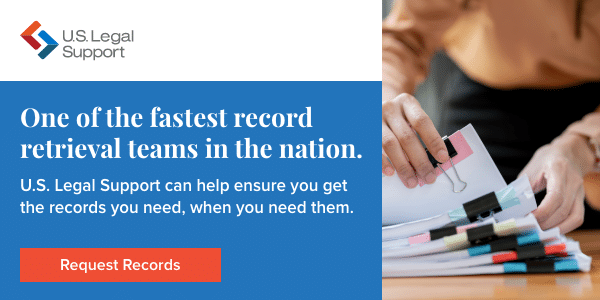Attorney Request for Medical Records: A Guide

A negligent surgeon, auto accident, personal injury, bar fight—many legal cases require requesting, analyzing, and organizing medical records. Whether you’re representing the plaintiff or the defendant, you’ll want to reduce the time that can easily be spent trying to compile the right medical information.
Let’s take a look at the steps to expedite an attorney request for medical records and what to do once you receive them.
Protecting Records and Remaining HIPAA Compliant
Before you start the medical record retrieval process, make sure you’re ready to fulfill your legal obligations according to the federal Health Insurance Portability and Accountability Act of 1996 (HIPAA) and any additional medical records guidelines in your state. Much of this area of legislation is related to confidentiality, down to the specifics of record requests and how third parties can access, utilize, and store them.
Partnering with a specialized medical records service partner provides an all-in-one service that takes on administrative work and ensures HIPAA compliance for law firms.
If you opt to handle a medical records request, be sure to:
- Follow HIPAA guidelines for the transmission and storage of physical and digital files
- Restrict access to authorized team members
- Ensure all team members and service providers understand and follow all guidelines
Requesting Medical Records
If you’ve gone through any lengthy injuries or illnesses yourself, you know that few of us have a single, unified medical record. Patients may see a single healthcare provider over a number of years, but be referred to specialists, sent to testing centers, and spend time in hospitals—all of which maintain their own unique billing records, which is what is included in medical records.
Corralling all these patient medical records requires patience and a keen eye for detail, and how you go about requesting them depends on what role you play in relation to the patient.
Requesting Records for a Client Patient
To get started with a medical record request:
- Sit down for a client interview and establish an honest, detailed medical history
- Gather copies of all medical and billing information your client has available
- Identify what documentation, notes, tests, etc., are needed
- Create a master list of providers
- Develop a plan to retrieve all patient medical records
Records can be requested in a few different ways with a consenting patient that fulfills HIPAA requirements. You can:
- Have the patient submit medical records requests to have them sent to your firm
- Obtain signed release forms and handle requests directly or via a retrieval partner
- Arrange a limited Power of Attorney from the patient for medical record retrieval
Requesting Records for an Unavailable Patient
If the patient in question is incapacitated or deceased, then you’ll likely be communicating with a next-of-kin family member or legal representative.
A request will need to be accompanied by documentation that proves the signing individual has legal standing to grant access to the records. This could include:
- Power of Attorney
- Last Will
- Letters Testamentary
- Health Care Directive
Requesting Records Without Patient or Provider Consent
Attorneys who require medical information other than from their clients can secure them in a few different ways. Records may be obtained:
- Directly from opposing counsel as evidentiary exhibits,
- With a court order from a judge or administrative tribunal, or
- Through a subpoena issued by an attorney or court clerk that documents how HIPAA Privacy Rule requirements were met. 1
Relying on a subpoena or court order isn’t only for the defense team, however. If your client is the patient in question, you may still need to compel records from each medical provider to obtain detailed or original notes that they do not typically allow patients to access—particularly for suits against healthcare providers or facilities.
Organizing Medical Records
Once you obtain the records, an important factor in extracting the necessary information is to keep them organized. You’ll want to take steps to ensure you can interpret and refer to them as efficiently as possible throughout and after the case. A few best practices include:
- Digitize files and utilize a system that allows for bookmarks and annotations
- Request paper files be provided as double-sided print-outs
- Ask for files to be provided in date sequence
- Use consistent processes to name digital files and label paper files
Efficient Medical Records Retrieval Starts with U.S. Legal Support
Whether you’re already in the middle of a case, or looking to improve efficiency in future litigation, we can help.
For nearly 30 years, U.S. Legal Support has served attorneys and law firms of all practice sizes and types. We provide comprehensive legal support services including nationwide medical record retrieval, analysis, and organization compliant with SOC 2 Type 2 and HIPAA regulations. Learn more about our medical record retrieval services for lawyers.
Plus, you can rely on U.S. Legal Support for court reporting and transcription, litigation consulting, interpreting and translation services, and more, with management through a secure Client Portal.
Reach out today to discuss your medical records and other legal support needs.
Sources:
- U.S. Department of Health and Human Services. Health Information Privacy / Court Orders and Subpoenas. https://www.hhs.gov/hipaa/for-individuals/court-orders-subpoenas/index.html

Editoral Policy
Content published on the U.S. Legal Support blog is reviewed by professionals in the legal and litigation support services field to help ensure accurate information. The information provided in this blog is for informational purposes only and should not be construed as legal advice for attorneys or clients.


